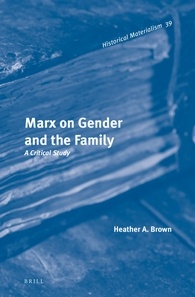Heather A. Brown, Westfield State University
This, the first book-length study devoted exclusively to Marx’s perspectives on gender and the family, offers a fresh look at this topic in light of twenty-first century concerns. Although Marx’s writings sometimes exhibit sexism, especially through the naturalization of certain female social functions, his work often transcends these. Brown studies those writings on gender, as well as his 1879-1882 notebooks on precapitalist societies and gender, some of them still unpublished in any language. The author argues that although Marx never fully developed these ideas, he gave important indications toward a theory of gender and society. This study attempts to fill a significant gap in the literature on Marx and offer some general insights into the intersectionality of gender and class.
Biographical note
Heather A. Brown, Ph.D. (2009), Purdue University, is an Assistant Professor of Political Science at Westfield State University. Her research interests are in modern and contemporary political thought especially involving the intersections of gender, race and class.
Readership
All interested in Marx, socialist feminism, Marxist philosophy and anthropology. Particularly for upper level undergraduates and graduate students.
Reviews
“This short, comprehensive handbook will no doubt provide the basis for a new wave of feminist engagement with Marxism and is a clarion call for all those who regard themselves as Marxists to re-evaluate their ideological conceptions.
Heather Brown allows us all to read Marx with new eyes.”
Barry Healy, Links International Journal of Socialist Renewal’s vision
“[T]he importance of this work goes beyond merely filling an unusual academic gap but is symbolic of a dual turn, in feminist theory of a return to the possibilities of Marx, and in socialist theory of the need to struggle against all forms of oppression, including gender.”
Jenny Morrison, Communiqué, published by the International Socialist Group, 13th December, 2012
Table of contents
Acknowledgements
1. Introduction
Reevaluating and developing Marx for feminist theory today
Overview of the book
2. The Early Writings on Gender and the Family
The 1844 Manuscripts
Labour and alienation
Gender in the 1844 Manuscripts
Women’s alienation in capitalist society
Modes of production and the course of history
Alienation, bourgeois morality and suicide
Revisiting the nature/culture and man/woman dualisms
Conclusion
3. Political Economy, Gender, and the ‘Transformation’ of the Family
Engels’s ‘Principles of Communism’ in relation to gender and the family
The Communist Manifesto
Nature and society in Capital
The political economy of Capital, Volume I
Gender and the family in Capital
Conclusion
4. Marx’s Journalism and Political Activities
The Preston strikes and women’s labour
The Bulwer-Lytton scandal
Women and the First International
Marx and the Kugelmanns
Women and the Paris Commune
After the Commune
Conclusion
5. Patriarchy, Women’s Oppression and Resistance: Comparing Marx and Engels on Gender and the Family in Precapitalist Societies
Marx’s notebooks and the history of The Origin of the Family
Separating Marx from Engels
Marx’s notebooks in historical context
Morgan’s Ancient Society
Marx’s notes on Morgan
Engels’s Origin of the Family, Private Property and the State
Engels’s uncritical acceptance of Morgan and Bachofen on women’s position in clan-societies
Comparing Marx and Engels on gender
6. The Family, the State and Property-Rights: The Dialectics of Gender and the Family in Precapitalist Societies
Maine’s Lectures on the Early History of Institutions
Marx’s notes on Maine
Marx’s notebooks on Ludwig Lange’s Römische Alterthümer
Conclusion
7. Conclusion
Evaluating Marx’s work on gender and the family for today
References
Index

